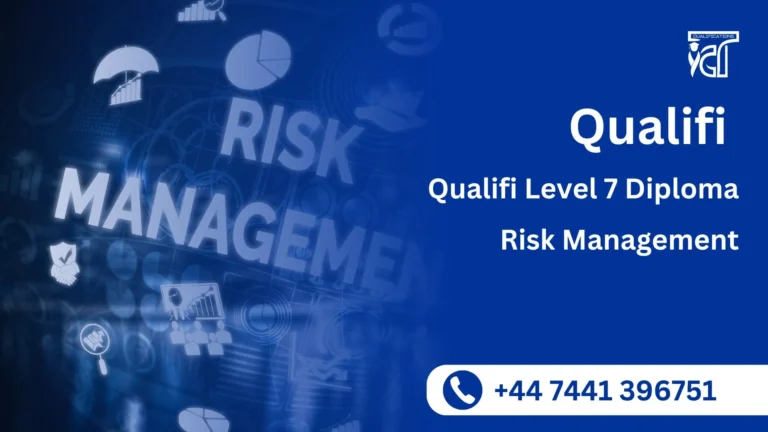Entrepreneurship plays a vital role in driving economic growth, innovation, and job creation. The ability to identify opportunities, develop business ideas, and navigate market challenges is essential for aspiring entrepreneurs. The Qualifi Level 4 Diploma in Entrepreneurship provides individuals with the skills and knowledge required to establish and manage a successful business. This qualification is designed to equip learners with a strong foundation in business operations, financial management, and strategic decision-making, preparing them for entrepreneurial ventures in diverse industries.
Entrepreneurship involves more than just starting a business; it requires critical thinking, problem-solving abilities, and a strong understanding of market dynamics. Successful entrepreneurs must be able to analyse trends, manage risks, and adapt to changing business environments. This diploma focuses on developing these competencies, ensuring that learners can create and sustain profitable business ventures. By understanding customer behaviour, competitive positioning, and financial planning, individuals gain the necessary expertise to turn ideas into viable businesses.
Completing this qualification opens doors to various career paths, including business ownership, start-up management, and consultancy roles. Entrepreneurs can leverage their skills to launch independent ventures or contribute to existing businesses by driving innovation and strategic growth. The diploma also serves as a stepping stone for further studies in business management, finance, and marketing, allowing learners to deepen their expertise in entrepreneurship.
This diploma enhances entrepreneurial capabilities by providing practical knowledge of business operations and decision-making. Learners gain financial literacy, leadership skills, and problem-solving abilities that are crucial for business success. The course also fosters an innovative mindset, enabling individuals to identify market gaps and develop solutions that meet consumer needs. By acquiring these skills, entrepreneurs can effectively manage risks, optimise resources, and sustain long-term business growth.
The Qualifi Level 4 Diploma in Entrepreneurship is an excellent choice for individuals who aspire to start their own businesses or enhance their entrepreneurial expertise. With a focus on business strategy, financial management, and market analysis, this qualification prepares learners for the challenges of modern entrepreneurship. Whether launching a start-up, managing an existing business, or exploring new market opportunities, this diploma provides the necessary foundation for long-term success in the entrepreneurial landscape.
The Qualifi Level 4 Diploma in Entrepreneurship qualification consists of 10 mandatory units for Credit Equivalency 120 for the completed qualification.
| Sr# | Unit Title | Credits | GLH |
| 1 | Managing Business Operations | 12 | 60 |
| 2 | Business Environment | 12 | 60 |
| 3 | Personal Effectiveness | 12 | 60 |
| 4 | The Entrepreneurial Manager | 12 | 60 |
| 5 | Business Planning and Goal Setting | 12 | 60 |
| 6 | The Manager’s Toolkit | 12 | 60 |
| 7 | Managing and Using Finance | 12 | 60 |
| 8 | Managing and Using Marketing | 12 | 60 |
| 9 | Psychology of Entrepreneurship | 12 | 60 |
| 10 | Innovation and Creativity | 12 | 60 |
GLH (Guided Learning Hours) and TQT (Total Qualification Time) are terms commonly used in vocational qualifications to help define the amount of time a learner is expected to spend on their studies.
1. GLH (Guided Learning Hours)
GLH refers to the number of hours a learner spends being directly taught, supervised, or supported during their course. This includes the time spent in activities such as:
- Classroom instruction
- Practical workshops
- One-on-one tutoring or mentoring sessions
- Online learning sessions with tutor support
In other words, GLH represents the time that learners are actively engaged with their instructors or learning activities.
2. TQT (Total Qualification Time)
TQT represents the total amount of time a learner is expected to invest in completing a qualification, including:
- GLH (Guided Learning Hours): Time spent on direct learning, as explained above.
- Self-Directed Learning: This includes time spent on independent study, research, assignment completion, preparation for exams, and any other work the learner does outside of direct teaching hours.
TQT is a broader measure that includes all the time required to achieve the qualification. It helps learners and employers understand the overall commitment required for the qualification.
Key Differences Between GLH and TQT:
- GLH focuses on direct learning with guidance or supervision.
- TQT includes GLH as well as independent study time and other learning-related activities.
Example:
If a qualification has a TQT of 600 hours and a GLH of 250 hours, it means the learner should spend 250 hours in direct learning (classroom, online, or tutor-led sessions) and 350 hours on independent study or research.
Learning Outcomes of Qualifi Level 4 Diploma in Entrepreneurship
Managing Business Operations
- Understand the key features of a business environment.
- Understand the key principles of accounting for business.
- Know the principles of managing and leading teams in organisations.
- Know the role of the Human Resources department.
- Understand the importance of customer service to organizational success.
Business Environment
- Understand the macro environment and its impact on an organisation.
- Understand the microenvironment and industry forces that impact an organisation in the 21st century.
- Understand the factors that shape the internal environment of an organisation and discuss how they give competitive advantage to companies.
- Compare different approaches adopted by organisations for absorbing change imposed by the external environment.
- Explore internal strategies for responding to globalization.
Personal Effectiveness
- Understand learning styles and analyse which learning approaches are most effective.
- Know how to plan time for maximum effectiveness and prioritization of workload.
- Know how to set appropriate goals for effective decision making.
- Understand styles and perspectives that can be used for problem solving.
- Develop strategies for managing stress.
The Entrepreneurial Manager
- Understand a range of management styles and approaches which support entrepreneurship in the modern workplace.
- Assess management styles and approaches.
- Be able to select appropriate management styles suited to particular organizational situations.
- Understand the benefits, disadvantages and risks of group innovation and decision making.
Business Planning and Goal Setting
- Understand the structure of a business plan.
- Know how to carry out appropriate analysis to facilitate the development of strategy for an organisation.
- Understand the key concepts central to competitive analysis and developing market strategy.
- Understand the role of measuring and monitoring business plan implementation.
The Manager’s Toolkit
- Understand the range of tools used in problem analysis.
- Know how to use tools and frameworks to assess the macro environment.
- Understand the competitive forces in the micro environment.
- Understand the distinguishing features of other tools used to develop strategies.
- Identify the tools necessary for successful implementation of strategic initiatives.
Managing and Using Finance
- Understand basic accounting principles.
- Understand the principle financial statements and the financial terms used within them.
- Understand the basic principles of costing and different types of cost.
- Understand the principles of budgeting.
Managing and Using Marketing
- Understand what marketing is and assess its importance universally across different sectors.
- Identify the range of methods and tools used for market segmentation, targeting and market positioning.
- Understand how the marketing mix could be configured to achieve different market positioning strategies.
- Understand the marketing planning process and the role of internal marketing in achieving successful marketing outcomes.
- Discuss the benefits of emarketing and explain how best you can reach targeted customers using a website.
Psychology of Entrepreneurship
- Understand the fundamental principles of psychology.
- Understand the processes of learning and behavior.
- Understand how motivation and emotions support entrepreneur ship.
- Understand the entrepreneurial personality.
Innovation and Creativity
- Understand theories of creativity and apply them to individuals and teams.
- Understand the stages of a systematic creative process
- Understand factors that drive innovation.
- Know ways that organisations encourage and facilitate innovation
Course Benefits of the Qualifi Level 4 Diploma in Entrepreneurship
- Comprehensive Entrepreneurial Knowledge – Provides a strong foundation in business planning, market research, and financial management.
- Practical Business Skills – Equips learners with problem-solving, leadership, and decision-making abilities essential for running a successful business.
- Enhanced Financial Literacy – Develops an understanding of budgeting, investment, and cash flow management for sustainable business growth.
- Adaptability and Innovation – Encourages creative thinking and adaptability to respond effectively to market changes and business challenges.
- Legal and Ethical Awareness – Covers key legal and ethical considerations to ensure compliance with business regulations and responsible entrepreneurship.
- Career and Business Opportunities – Opens pathways to launching start-ups, managing existing businesses, or progressing to higher-level business qualifications.
- Increased Confidence in Business Operations – Builds the skills and knowledge necessary to make informed strategic decisions and drive business success.
Ideal Learner for the Qualifi Level 4 Diploma in Entrepreneurship
The Qualifi Level 4 Diploma in Entrepreneurship is designed to equip learners with the knowledge and skills needed to succeed in the dynamic world of business. Whether aspiring to launch a start-up, manage an existing enterprise, or explore innovative business opportunities, this qualification provides a solid foundation in entrepreneurial principles. It is suitable for individuals from various backgrounds who are keen to develop their business acumen and strategic decision-making abilities.
Aspiring Entrepreneurs
- Individuals looking to start their own business and develop a sustainable business model.
- Those with innovative ideas who want to learn how to turn them into viable ventures.
Business Owners and Managers
- Entrepreneurs who already own a business but seek to enhance their strategic and operational knowledge.
- Small business owners aiming to expand their enterprises and improve financial management.
Career Changers and Professionals
- Individuals transitioning from employment to self-employment or business ownership.
- Professionals who want to gain entrepreneurial skills to advance their careers or take on leadership roles.
Graduates and Students
- Recent graduates seeking practical business knowledge to complement their academic background.
- Students who want to build entrepreneurial competencies alongside their studies.
Innovators and Problem-Solvers
- Individuals with a creative mindset who want to develop solutions for market challenges.
- Those interested in understanding how innovation drives business success and sustainability.
This qualification is ideal for individuals who are motivated, resourceful, and eager to develop the skills needed to navigate the complexities of entrepreneurship. It provides a structured learning path to help learners turn their ambitions into tangible business success.
Entry Requirements
Register Now
Qualification Process
Qualification Process for the Qualifi Level 4 Diploma in Entrepreneurship
- Self-Assessment:
Begin by evaluating your eligibility to ensure you meet the qualification requirements, including work experience, knowledge, and language proficiency. - Registration:
Complete your registration by submitting the required documents, including a scanned copy of a valid ID, and paying the registration fee. - Induction:
An assessor will conduct an induction to confirm your eligibility for the course and explain the evidence requirements. If you do not meet the criteria, your registration will be canceled, and the fee will be refunded. - Assignments & Evidence Submission:
Provide all assignments and the necessary evidence based on the assessment criteria outlined in the course. If you are unsure of the required evidence, consult with the assessor for guidance on the type and nature of evidence needed. - Feedback and Revision:
The assessor will review your submitted evidence and provide feedback. Evidence that meets the criteria will be marked as “Criteria Met,” while any gaps will be identified. You will be asked to revise and resubmit if needed. - Competence Evidence:
Submit final evidence demonstrating that all learning outcomes have been met. This evidence will be marked as “Criteria Met” by the assessor once it is satisfactory. - Internal Quality Assurance (IQA):
The Internal Quality Assurance Verifier (IQA) will review your evidence to ensure consistency, quality, and compliance with standards. - External Verification:
The IQA will submit your portfolio to Qualifi’s External Quality Assurance Verifiers (EQA) for final confirmation. The EQA may contact you directly to verify the authenticity of your evidence. - Certification:
Upon successful completion of all checks, Qualifi will issue your official certificate, confirming that you have attained the Qualifi Level 4 Diploma in Entrepreneurship.







